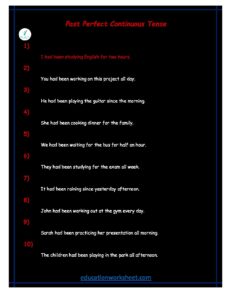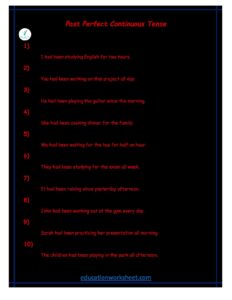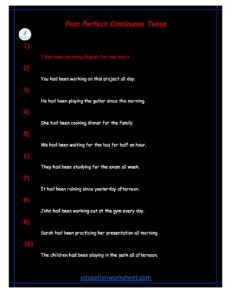how to converting Past Perfect Continuous Tense positive sentences to interrogative form
how to converting Past Perfect Continuous Tense positive sentences to interrogative form
Introduction
In the realm of English grammar, understanding how to transform various sentence structures is crucial for effective communication. One such transformation involves converting positive sentences in the Past Perfect Continuous tense into interrogative sentences. The Past Perfect Continuous tense is used to describe actions or events that occurred in the past, were ongoing, and were completed before another point in the past. This guide will delve into the rules and techniques for converting positive Past Perfect Continuous tense sentences into interrogative sentences, helping you master this aspect of English grammar.
Understanding Past Perfect Continuous Tense

The Past Perfect Continuous tense is formed by using the past perfect of the verb “to have” (had), the past participle of the verb “to be” (been), and the present participle of the main verb (adding “-ing”). This tense is typically used to indicate that an action or event started in the past and continued until a specific point in the past. For example, “She had been studying for hours before the exam.”
Basic Structure of Past Perfect Continuous Tense

Before diving into the conversion process, it’s essential to understand the basic structure of a positive Past Perfect Continuous tense sentence. It consists of the subject, “had been,” the base verb + “-ing” form, and additional details as necessary.
Positive Past Perfect Continuous Tense Sentence Structure: [Subject] + [had been] + [base verb + “-ing”] + [additional details]
For instance:
- She had been working on the project for weeks.
- They had been playing football all evening.
Conversion Rules and Techniques
- Begin with the auxiliary verb “Had” to create the interrogative form. To convert a positive Past Perfect Continuous tense sentence into an interrogative one, you start with the auxiliary verb “had.” Place it at the beginning of the sentence. For example:
Original: “She had been practicing the piano.” Interrogative: “Had she been practicing the piano?”
- Invert the subject and the auxiliary verb. The next step involves inverting the subject and the auxiliary verb to create a question. The subject moves from its original position to follow the auxiliary verb “had.” For instance:
Original: “They had been studying English.” Interrogative: “Had they been studying English?”
- Add a question word if needed. In some cases, you may need to include question words (who, what, when, where, why, how) at the beginning of the interrogative sentence to seek specific information. For example:
Original: “I had been watching a movie.” Interrogative with a question word: “What had I been watching?”
- Keep the rest of the sentence structure intact. The rest of the sentence structure, including the base verb + “-ing” and any additional details, remains the same. Only the subject and auxiliary verb positions change. For example:
Original: “He had been fishing since morning.” Interrogative: “Had he been fishing since morning?”
- Use rising intonation in speech. In spoken English, it’s crucial to use rising intonation while asking interrogative questions. This rising tone at the end of the sentence signals that you are asking a question. In written English, a question mark (?) denotes the interrogative form.
how to converting Past Perfect Continuous Tense positive sentences to interrogative form

Common Examples and Practice
To solidify your understanding, let’s practice converting some positive Past Perfect Continuous tense sentences into interrogative ones:
- Original: “She had been cooking dinner.” Interrogative: “Had she been cooking dinner?”
- Original: “They had been painting the walls all day.” Interrogative: “Had they been painting the walls all day?”
- Original: “He had been studying for the test.” Interrogative: “Had he been studying for the test?”
- Original: “I had been waiting for hours.” Interrogative: “Had I been waiting for hours?”
- Original: “We had been exploring the city since morning.” Interrogative: “Had we been exploring the city since morning?”

